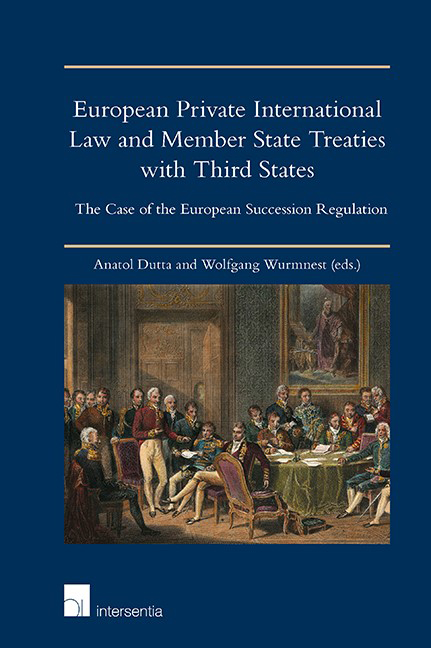 European Private International Law and Member State Treaties with Third States
European Private International Law and Member State Treaties with Third States Book contents
- Frontmatter
- Foreword
- Contents
- List of Treaties and Conventions
- List of Abbreviations
- List of Contributors
- Introduction
- Questionnaire
- PART I THE PERSPECTIVE OF EU MEMBER STATES
- PART II THE PERSPECTIVE OF THIRD STATES
- Bosnia and Herzegovina, Serbia, North Macedonia and Montenegro
- Iran
- Switzerland
- Turkey
- PART III THE PERSPECTIVE OF THE EUROPEAN UNION AND A COMPARATIVE OUTLOOK
- Annex
- Index
- About the Editors
Bosnia and Herzegovina, Serbia, North Macedonia and Montenegro
from PART II - THE PERSPECTIVE OF THIRD STATES
Published online by Cambridge University Press: 12 November 2019
- Frontmatter
- Foreword
- Contents
- List of Treaties and Conventions
- List of Abbreviations
- List of Contributors
- Introduction
- Questionnaire
- PART I THE PERSPECTIVE OF EU MEMBER STATES
- PART II THE PERSPECTIVE OF THIRD STATES
- Bosnia and Herzegovina, Serbia, North Macedonia and Montenegro
- Iran
- Switzerland
- Turkey
- PART III THE PERSPECTIVE OF THE EUROPEAN UNION AND A COMPARATIVE OUTLOOK
- Annex
- Index
- About the Editors
Summary
INTRODUCTION
In the 1950s and 1960s, former Yugoslavia entered into bilateral treaties on legal assistance with Austria (Treaty 3), Bulgaria (Treaty 22), Czechoslovakia (Treaty 13), Hungary (Treaty 25), Poland (Treaty 26) and Romania (Treaty 27). Today these treaties are in force between the four successor countries of Yugoslavia – i.e. Serbia, Bosnia and Herzegovina (henceforth: B&H), North Macedonia (henceforth: Macedonia) and Montenegro – and all the abovementioned European countries, which in the meantime have become EU Member States (in the case of Czechoslovakia, the Czech Republic and Slovakia as its successors). Each of these bilateral treaties contains the conflict-of-laws rules and procedural rules on succession that take precedence over, respectively, the rules of the Succession Regulation (Article 75(1)) in the contracting parties that are now EU Member States and the national private international law (PIL) rules in the four successor countries of former Yugoslavia that are not EU members. As these rules are based on the principle of nationality and the principle of the location of the estate, they are completely incompatible with the rules of the Succession Regulation and are, therefore, undesirable in the EU Member States. From the perspective of the successor countries of former Yugoslavia, a general assessment of the rules on succession contained in bilateral treaties cannot be given, mainly because international succession law is not consistently regulated in the successor countries: the rules of Serbian, B&H and Macedonian international succession law are based on traditional principles that correspond to those of the bilateral treaties, while the rules of Montenegrin international succession law follow the principles contained in the Succession Regulation. In order to make a proper assessment, it is first necessary to make a few remarks on the conflict-of-laws and procedural rules on succession in Serbia, B&H, Macedonia and Montenegro and then to look into the conflict-of-laws regimes and the procedural rules of the bilateral treaties in detail.
A FEW REMARKS ON NATIONAL PRIVATE INTERNATIONAL LAW RULES IN SUCCESSION MATTERS
SERBIA AND BOSNIA AND HERZEGOVINA
The main legal source of private international law in Serbia and B&H is the Act on Resolution of Conflict of Laws with Regulations of Other Countries (henceforth: PIL Act), which was enacted in 1982 in the former Socialist Federal Republic of Yugoslavia (henceforth: SFRY) and is, with minor amendments, still in force today in both countries.
- Type
- Chapter
- Information
- European Private International Law and Member State Treaties with Third StatesThe Case of the European Succession Regulation, pp. 209 - 252Publisher: IntersentiaPrint publication year: 2019
- 1
- Cited by


